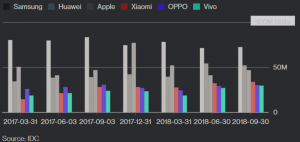Apple may be facing a countrywide “informal boycott” from its Chinese consumers according to the Back of America Merill Lynch. A major factor could be attributed to the current trade war between USA and China.
According to experts, a bunch of industry-specific factors such as extremely competitive environment from Chinese manufactures along with the political carnage that’s been going on between USA and China has caused some major fluctuation in Apple’s stock. However, the latest development in the USA vs China fiasco shows that many
local Chinese consumers are now abandoning Apple in a bid to join other much affordable and local smartphone companies.
According to Bank of America Merill Lynch’s economists Ethan Harris and Aditya Bhave:
“According to a survey conducted by our colleagues in equity research, consumers in China and India are showing less interest in upgrading to an iPhone and more interest in upgrading to Xiaomi and Samsung.”
So according to the survey, consumers not only in China but also in India are leaving Apple, the worrying sign for Apple is that the current iOS users in these two countries are now planning to shift to Xiaomi, Huawei or Samsung which means that
Apple is potentially losing its market share to the Chinese and South Korean manufacturers. A bigger worrying sign for the Cupertino giant is that China has been Apple’s biggest revenue generator for the iPhone sales and if local manufacturers are eating Apple’s market share then Tim Cook must change the company’s policy.
In 2018, Apple lost its second spot to Huawei as the second largest smartphone manufacturer, and the company might lose a lot more in 2019 since Apple might be the most affected company from the rising trade tension between USA and China. According to the survey the analyst attributes the problem to three key issues,
- Trade war fears have already undercut the U.S. equity market and fears of a hard landing for China add to that pressure
- The trade war tends to weaken the yuan, making a broad range of U.S. products less competitive and lowering the dollar value of earnings overseas
- Informal boycotting of U.S. products adds further to the U.S.-China trade deficit
Furthermore, Donald Trump’s recent suggestion to Tim Cook to start manufacturing the iPhones in the USA may have a pivotal change in the current smartphone market. If Apple shifts its manufacturing plants to the USA, then the price of iPhones will drastically increase, which may become the deciding factor of Apple’s future.
However, the current trade war might have a greater effect on USA’s economy rather than China, the major reason for this is any further tariffs would directly affect the U.S. shoppers more since the boost from prior fiscal easing is fading, and China has more scope to support its economy. The report summed up the current situation in six simple words:
“Everyone loses in a trade war.”






 Everything that Samsung announced at CES 2019
Everything that Samsung announced at CES 2019